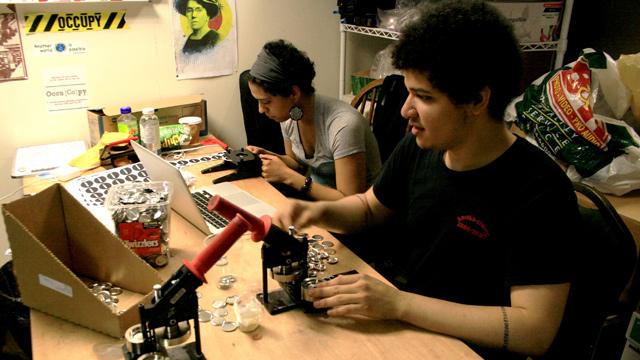
Photo: Tejada and Ronny Nunez Crysbel working on OccuCopy. IndigNación.
When we talk about Latino presence in the Occupy Movement, sometimes we forget that, besides the individuals on the streets, there are methods, strategies and past experiences of struggle elsewhere that our movement can and should feed from.
For some of those who camped for weeks in Liberty Square last fall, the concept of workers without bosses became a reality in various forms, modeled on alternatives that already exist within the current economic model of wealth distribution. Part of the purpose of occupying is to create and promote new structures that combat the current system; not to get stuck in mere critique, but to turn ourselves into the facilitators of our own solutions. An example of these initiatives are workers' cooperatives. Using occupied, worker-run factories in Buenos Aires and elsewhere as an inspiration, the first workers' cooperative of Occupy Wall Street was born: a print shop named OccuCopy.
Operating with the approval of the New York City General Assembly, OccuCopy has mainly been dedicated to printing materials related to the occupation -- everything from flyers and posters to stickers and pins. Among those steering the collective are two members of The Working World, an organization that helps provide micro-loans to cooperatives and worker-owned businesses, mainly in Argentina and Nicaragua. The successful model of worker cooperatives in Latin America has nurtured this growing cooperative at Occupy Wall Street.
Born of a desire to develop sustainable infrastructures within the occupation, and operating according to the ideals of this movement, OccuCopy seeks to use the earnings of the cooperative to jump-start other cooperatives in the city. These new cooperatives would in turn commit to help finance the creation of more cooperatives, and so on. It's an ambitious project at both a structural and personal level, and it will require a long process of transformation. But OccuCopy is a start.
According to recent studies, 130 million Americans (more than 40% of the population) are already members of a cooperative of some kind, while 13 million are worker-owners of more than 11,000 companies. The rationale is already clear to many: re-structuring the traditional ways in which we understand work and the distribution of capital gives the power of decision-making and participation to the workers themselves. It also facilitates the search for creative and responsible solutions to companies' economic troubles, rather than relying on layoffs, benefit reductions and other common methods of top-down business management. Furthermore, cooperatives promote a fair work environment with evenly distributed responsibilities, betting on the collective instead of the individual.
In Argentina, the occupation of factories and other businesses by workers was a common tactic employed after the economic crisis of 2001, when many companies tried to shutter operations, leaving thousands unemployed. In places like the Zanón ceramic factory or the Bauen Hotel, workers refused to abandon their jobs; instead, they occupied their offices, assuming the challenge of rescuing the commercial future of their enterprises while creating more just administrative structures for those enterprises. The crisis provoked a dramatic turn towards self-generated work: the creation of collectives, cooperatives and small businesses meant that workers wouldn't be at the mercy of big interests or multinational corporations.
It's essential for Occupy Wall Street to learn from the history and experience of other movements throughout the world in its search for solutions and alternatives. This is the only way in which we'll be able to rethink our reality.
OccuCopy works for the occupation and the 99% at large, and can be visited at www.occucopy.org.
3 WAYS TO SHOW YOUR SUPPORT
- Log in to post comments















